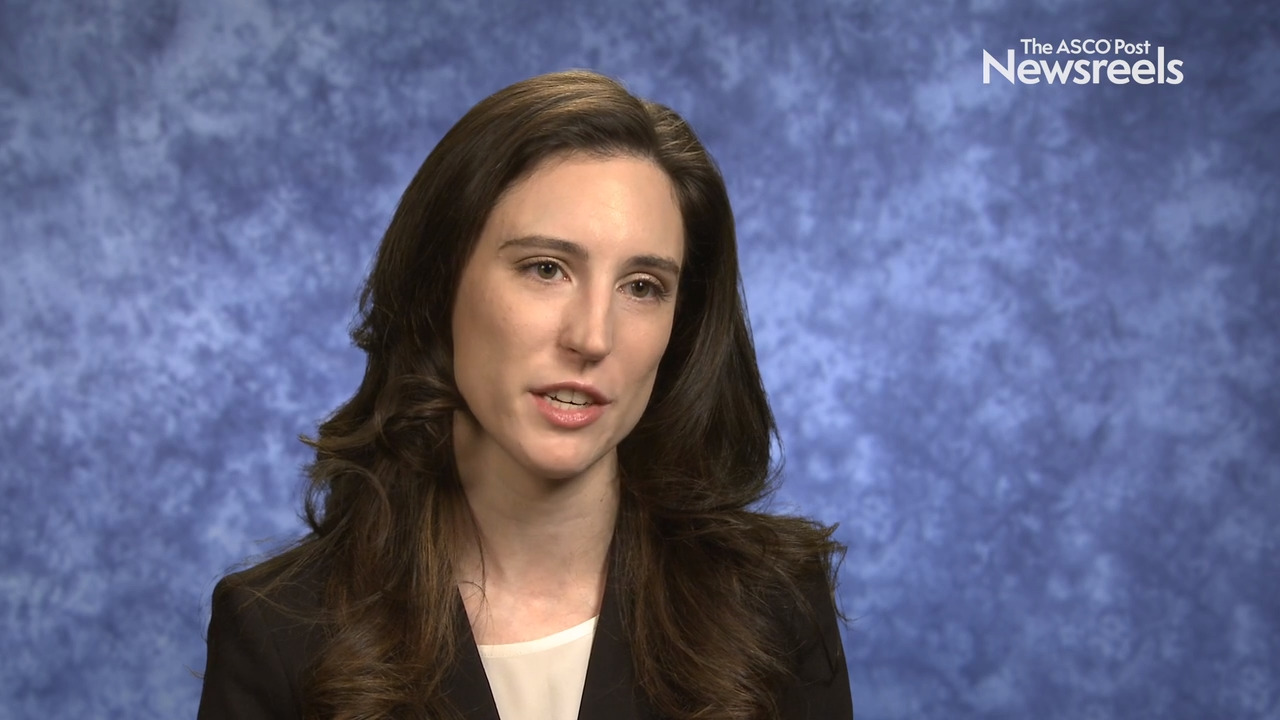TAT 2019: Trends in Distribution of Cancer Type in Phase I Trials
The proportion of early-stage drug trials tackling the most common tumor types has declined sharply since the early 1990s, as less common cancers receive increasing attention in trials, according to new research presented by Sato et al at the TAT 2019–International Congress on Targeted...
AACR 2019: Survey Finds Young-Onset Colorectal Cancer Is Often Misdiagnosed, Treated at Later Stages
A recent study by the American Cancer Society (ACS) has found that while colorectal cancer incidence in the United States is rapidly declining overall, colorectal cancer rates are increasing among young adults. According to the study, compared with adults born in the 1950s, those born in the 1990s...
Expert Point of View: Michael J. Overman, MD
INVITED STUDY discussant Michael J. Overman, MD, Professor of Gastrointestinal Medical Oncology at The University of Texas MD Anderson Cancer Center, Houston, is a co-investigator on CheckMate 142, which led to the approval of another immunotherapy doublet—nivolumab plus ipilimumab—in patients...
Durvalumab and Tremelimumab Combination Active in Refractory Microsatellite-Stable Colorectal Cancer
THE COMBINATION of durvalumab and tremelimumab prolonged median overall survival by 2.5 months compared with best supportive care alone in patients with advanced treatment-refractory colorectal cancer. These findings, which are from the randomized phase II Canadian Cancer Trials Group (CCTG) CO.26...
Direct-to-Consumer Genetic Test on Hereditary Colorectal Cancer Syndrome Receives FDA Clearance
ON JANUARY 22, 2019, 23andMe received U.S. Food and Drug Administration (FDA) clearance for a genetic health risk report on the hereditary colorectal cancer syndrome MUTYH-associated polyposis. The clearance follows the FDA’s authorization for 23andMe’s BRCA1/BRCA2 (Selected Variants) Genetic...
Do Certain Sedentary Behaviors Increase the Risk of Young-Onset Colorectal Cancer?
Although colorectal cancer rates in older adults have been decreasing in the United States since the mid-1980s, incidence rates for the cancer have been increasing among young and middle-aged adults, according to a study by the American Cancer Society (ACS). Based on the new data, in 2018, the ACS...
Watch-and-Wait Strategy for Rectal Cancer With Complete Clinical Response After Neoadjuvant Therapy
In a single-center retrospective case series analysis reported in JAMA Oncology, Smith et al found that a watch-and-wait approach was associated with a high rate of rectal preservation and pelvic tumor control in patients with rectal cancer with complete clinical response to neoadjuvant therapy,...
Polymorphisms in Pattern Recognition Receptors as Predictors of Oxaliplatin Benefit in Colorectal Cancer
In a study reported in the Journal of the National Cancer Institute, Gray et al found that constitutional loss of function single-nucleotide polymorphisms in the pattern recognition receptors FPR1, TLR3, and TLR4 were not associated with preferential benefit of oxaliplatin in colorectal cancer. As...
23andMe Receives FDA Clearance for Direct-to-Consumer Genetic Test on a Hereditary Colorectal Cancer Syndrome
On January 22, 23andMe received U.S. Food and Drug Administration (FDA) clearance for a genetic health risk report on MUTYH-associated polyposis, a hereditary colorectal cancer syndrome. The clearance follows the FDA’s authorization for 23andMe’s BRCA1/BRCA2 (Selected Variants)...
Pieter Tanis, MD, PhD, on Colon Cancer: Results From the COLOPEC Trial on Adjuvant HIPEC
Pieter Tanis, MD, PhD, of Amsterdam University Medical Centers, discusses study findings on adjuvant hyperthermic intraperitoneal chemotherapy (HIPEC) in patients with colon cancer who are at high risk of peritoneal metastases (Abstract 482).
Francesca Battaglin, MD, on Colorectal Cancer: Using Genetic Variants to Predict Treatment Efficacy
Francesca Battaglin, MD, of the University of Southern California Norris Comprehensive Cancer Center, discusses phase III study data on genetic variants used to predict the efficacy of cetuximab in patients with metastatic colorectal cancer (Abstract 564).
Jeffrey A. Meyerhardt, MD, MPH, on Colon Cancer: Results From the ACTS-CC 02 Trial on Adjuvant Chemotherapy
Jeffrey A. Meyerhardt, MD, MPH, of Dana-Farber Cancer Institute, discusses phase III study findings on S-1/oxaliplatin vs uracil and tegafur/leucovorin as adjuvant chemotherapy for high-risk stage III colon cancer (Abstract 484).
Carl C. Schimanski, MD, PhD, on Colorectal Cancer Liver Metastases: Study Results on Tecemotide After Surgery
Carl C. Schimanski, MD, PhD, of the Municipal Hospital Darmstadt, discusses phase II study findings on adjuvant immunotherapy with tecemotide after colorectal cancer liver metastasectomy (Abstract 480).
2019 GI Cancers Symposium: Rectal Cancer Treated With Total Neoadjuvant Therapy Plus Short-Course Radiation vs Concurrent Chemoradiation
The delivery of all radiotherapy and chemotherapy neoadjuvantly—also known as total neoadjuvant therapy—has improved complete response and downstaging rates compared to treatment after surgery in patients with rectal cancer. In a study presented by Chapman et al at the 2019...
2019 GI Cancers Symposium: Is Adjuvant HIPEC Effective in Reducing the Risk of Peritoneal Metastases in Patients With Colon Cancer?
Patients with advanced or perforated colon cancer may be at elevated risk of peritoneal metastases. Since many patients with peritoneal metastases are diagnosed at a late stage, researchers sought to study the effectiveness of hyperthermic intraperitoneal chemotherapy (HIPEC) in the adjuvant...
2019 GI Cancers Symposium: Durvalumab, Tremelimumab, and Best Supportive Care vs Best Supportive Care Alone in Advanced, Refractory Colorectal Cancer
The phase II CCTG CO.26 trial evaluated whether the combination of durvalumab, a programmed cell death ligand 1 (PD-L1) inhibitor, and tremelimumab, an anti–cytotoxic T-lymphocyte–associated protein 4 (CTLA-4) antibody, plus best supportive care improved survival vs best supportive care ...
FDA Pipeline: Designations for Treatments of Graft-vs-Host-Disease, Colorectal Cancer, Pancreatic Cancer, and More
The U.S. Food and Drug Administration (FDA) recently issued the following new designations and clearances: Fast Track Designation for Itolizumab for the Treatment of Acute Graft-vs-Host Disease The FDA granted Fast Track designation to itolizumab for the treatment of acute graft-vs-host ...
2018 Young-Onset Colorectal Cancer Survey Report Covers Disease Stage at Diagnosis and More
Nearly three-quarters of patients with young-onset colorectal cancer are diagnosed with an advanced stage of the disease, a significantly higher percentage than has been reported for their more mature peers, according to a report from the Colorectal Cancer Alliance. The findings of...
Negative Colonoscopy and Long-Term Risk of Colorectal Cancer
Ten years after a negative colonoscopy, patients who were rescreened for colorectal cancer had a lower risk of being diagnosed with and were less likely to die from colorectal cancer compared with those who did not undergo colorectal cancer screening, according to a study published by Lee et al...
Postoperative Outcomes With Screening- vs Nonscreening-Detected Colorectal Cancers
In a Dutch study reported in JAMA Surgery, Michael P.M. de Neree tot Babberich, MD, of the Department of Gastroenterology and Hepatology, Academic Medical Center, Amsterdam, and colleagues found that postoperative outcomes were better in patients with colon cancer, but not rectal cancer, detected...
Does Tailored Lifestyle Feedback Given During Colorectal Cancer Screening Improve Disease-Preventive Behaviors?
A program that provided individually tailored lifestyle recommendations for patients undergoing screening for colorectal cancer helped encourage healthy behavior, according to results published by Knudsen et al in Cancer Epidemiology, Biomarkers & Prevention. “It is well known that...
CIMRA Assay for Detection of Gene Variants in Lynch Syndrome
An international team of researchers has developed, calibrated, and validated a novel tool for identifying the genetic changes in Lynch syndrome genes that are likely to be responsible for causing symptoms of the disease. The results were published by Drost et al in Genetics in Medicine. ...
Eicosapentaenoic Acid and Aspirin in Preventing Colorectal Adenomas
In a UK trial (seAFOod Polyp Prevention) reported in The Lancet by Hull et al, no differences in adenoma prevention were found after treatment with omega-3 polyunsaturated fatty acid eicosapentaenoic acid (EPA), aspirin, both, or placebo in patients with high-risk findings on colonoscopy. On the...
Primary Resistance to Immune Checkpoint Inhibitors in Metastatic Colorectal Cancer and Misdiagnosis of MSI or dMMR Status
In a study reported in JAMA Oncology, Cohen et al found evidence that primary resistance to immune checkpoint inhibitor treatment in metastatic colorectal cancer (CRC) can be explained in some cases by misdiagnosis of microsatellite instability (MSI) or defective mismatch repair (dMMR) status....
Expert Point of View: Julien Taieb, MD
JULIEN TAIEB, MD, Professor of Medicine at Paris Descartes University in France, said the MODUL cohort was based on a clear rationale for adding atezolizumab (Tecentriq) to bevacizumab (Avastin) in the metastatic colorectal cancer setting. In immunodeficient mice, the combination of an...
No Benefit for Atezolizumab Plus Standard of Care for Maintenance in Colorectal Cancer Subset
ADDING ATEZOLIZUMAB (Tecentriq) to a fluoropyrimidine plus bevacizumab (Avastin) did not improve outcomes for patients with BRAF wild-type metastatic colorectal cancer enrolled in the umbrella MODUL trial.1 “Despite activity in other, immune-responsive tumor types, there was no improvement in...
Many Patients Do Not Receive Surveillance Colonoscopies Following a Diagnosis of High-Risk Adenomas
A population-based study examining patient receipt of a surveillance colonoscopy 3 years after the removal of high-risk adeonomatous polyps has found that the procedure was underutilized and varied by health-care system, patient age, and number of adenomas found. Strategies to improve adherence to...
Multimodality Therapy and Lateral Local Recurrence in Rectal Cancer
In a study reported in the Journal of Clinical Oncology, Ogura et al found that lateral lymph node dissection (LLND) reduced the risk of lateral local recurrence in patients with lateral nodes ≥ 7 mm undergoing neoadjuvant chemoradiation or radiation and total mesorectal excision in clinical...
First-Line Immunotherapy Shows Benefit in Metastatic Colorectal Cancer Subset
In previously untreated patients with metastatic colorectal cancer and tumors demonstrating microsatellite instability–high (MSI-high) or mismatch repair deficiency (dMMR), immunotherapy with nivolumab (Opdivo) and low-dose ipilimumab (Yervoy) produced a durable clinical benefit in the...
Sequential vs Combination Fluoropyrimidine, Irinotecan, and Bevacizumab in Metastatic Colorectal Cancer
In a German phase III noninferiority trial (XELAVIRI) reported by Modest et al in the Journal of Clinical Oncology, noninferiority of first-line sequential vs combination fluoropyrimidine, irinotecan, and bevacizumab (Avastin) was not demonstrated in metastatic colorectal cancer (CRC). Benefit of...
Pre- and Postdiagnosis Diet and Risk of Mortality in Colorectal Cancer
In a study reported in the Journal of Clinical Oncology, Guinter et al found that better prediagnosis and postdiagnosis dietary patterns were associated with improved overall and colorectal cancer–specific survival among patients diagnosed with colorectal cancer. Study Details The...
FDA Approves Levoleucovorin for Treatment in Osteosarcoma, Colorectal Cancer
The U.S. Food and Drug Administration (FDA) recently approved levoleucovorin (Khapzory) injection, a folate analog, for three indications: rescue after high-dose methotrexate therapy in patients with osteosarcoma; diminishing the toxicity associated with overdosing on folic acid antagonists or...
ESMO 2018: CheckMate-142 Reports New Data on First-Line Nivolumab Plus Low-Dose Ipilimumab in MSI-H/dMMR Metastatic Colorectal Cancer
The combination of nivolumab (Opdivo) and low-dose ipilimumab (Yervoy) could become a new first-line treatment in patients with microsatellite instability–high (MSI-H), mismatch repair–deficient (dMMR) metastatic colorectal cancer, following results from the CheckMate-142 trial reported ...
ESMO 2018: Small Study of Preoperative Nivolumab Plus Ipilimumab in dMMR Colon Cancer
Neoadjuvant treatment with a combination of the immune checkpoint inhibitors nivolumab (Opdivo) and ipilimumab (Yervoy) achieved major pathological responses in mismatch repair–deficient (dMMR) early-stage colon cancers, according to results reported by Chalabi et al at the European...
FDA Approves Levoleucovorin for Treatment in Osteosarcoma, Colorectal Cancer
The U.S. Food and Drug Administration (FDA) recently approved levoleucovorin (Khapzory) injection, a folate analog, for three indications: rescue after high-dose methotrexate therapy in patients with osteosarcoma; diminishing the toxicity associated with overdosage of folic acid...
Dutch Study of Postoperative Outcomes With Screening- vs Nonscreening-Detected Colon and Rectal Cancers
In a Dutch study reported in JAMA Surgery, de Neree tot Babberich et al found that postoperative outcomes were better in patients with colon cancer, but not rectal cancer, detected vs not detected through the national fecal immunochemical test–based screening program. Study ...
Sex-Linked Differences in Cancer May Identify Specific Genetic Drivers, Predict Responses to Treatment
Analysis of male- and female-derived tumor samples revealed differences in prognostic biomarkers, genes that drive cancer, and in regulation of key pathways that may predict responses to treatment, according to results published in two studies in Cancer Research, one by Li et al and the other...
First-Line EGFR Inhibitor Plus FOLFOX4 in RAS Wild-Type Metastatic Colorectal Cancer
In the Chinese phase III TAILOR trial reported in the Journal of Clinical Oncology, Qin et al found that adding the EGFR inhibitor cetuximab to FOLFOX4 (fluorouracil, leucovorin, oxaliplatin) improved progression-free survival in patients with RAS wild-type metastatic colorectal cancer. Study...
Triplet Combination for Advanced Anal Squamous Cell Carcinoma
In a French phase II trial reported in The Lancet Oncology, Stefano Kim, MD, of the Department of Oncology, University Hospital of Besancon, and colleagues found that treatment with docetaxel, cisplatin, and fluorouracil (DCF) was active in patients with metastatic or unresectable locally...
Maintenance Therapy for Metastatic Colorectal Cancer: Benefit Seen With Panitumumab Combination
Although the optimal approach to maintenance is not definitive in patients with metastatic colorectal cancer who have undergone chemotherapy-based induction with anti–endothelial growth factor receptor (EGFR) agents, the phase II VALENTINO trial showed that anti-EGFR maintenance therapy with...
PMS2-Associated Lynch Syndrome and Cancer Risks
In a study reported in the Journal of Clinical Oncology, ten Broeke et al found that patients with Lynch syndrome associated with PMS2 mutation are at increased risk of colorectal and endometrial cancers but not other cancers associated with the syndrome. As noted by the investigators, Lynch...
Genetic Forecasting May Predict Response to Cetuximab in Colorectal Cancer
Blood tests could predict how long it takes until colorectal cancer becomes resistant to treatment based on the same principle used in forecasting the weather, a new study by Khan et al in Cancer Discovery has found. The liquid biopsies could also predict patients that are unlikely to initially...
Ipilimumab in Combination With Nivolumab for MSI-H or dMMR Metastatic Colorectal Cancer
On July 10, 2018, ipilimumab (Yervoy) was granted accelerated approval for use in combination with nivolumab (Opdivo) for the treatment of patients at least 12 years of age with microsatellite instability–high (MSI-H) or mismatch repair–deficient (dMMR) metastatic colorectal cancer progressing...
Sequential Liquid Biopsy Sampling May Be a Predictive Tool for Early Disease Progression in Patients With Colorectal Cancer
According to the American Cancer Society, excluding skin cancers, colorectal cancer is the third most common cancer among men and women in the United States, with over 97,000 new cases expected this year, and is the third leading cause of cancer-related death, with over 50,000 deaths predicted in...
ERBB2/ERBB3-Mutant Colorectal Cancer
A study reported in the Journal of the National Cancer Institute by Loree and colleagues found that ERBB2/ERBB3 mutations in colorectal cancer are associated with microsatellite instability and PIK3CA mutation. Kanwal Raghav, MD, MBBS, of the Division of Gastrointestinal Medical Oncology, The...
FDA Grants Breakthrough Therapy Designation for Encorafenib Plus Binimetinib and Cetuximab in BRAF V600E–Mutant Metastatic Colorectal Cancer
The U.S. Food and Drug Administration (FDA) has granted Breakthrough Therapy designation for encorafenib (Braftovi) in combination with binimetinib (Mektovi) and cetuximab (Erbitux) for the treatment of patients with BRAF V600E–mutant metastatic colorectal cancer (mCRC), as detected by...
ACS Nutrition and Physical Activity Guidelines for Cancer Survivors and Outcomes After Colon Cancer Diagnosis
IN A STUDY reported in JAMA Oncology, Erin L. Van Blarigan, ScD, of the University of California, San Francisco, and colleagues found that adherence to American Cancer Society (ACS) nutrition and physical activity guidelines for cancer survivors was associated with improved survival among patients ...
BRAF Mutations, Survival, and Recurrence in Patients With Colorectal Cancer Liver Metastases
In a study reported in JAMA Surgery by Margonis and colleagues, the presence of a BRAF V600E mutation was associated with a higher risk of recurrence and poorer overall survival among patients undergoing surgical resection of liver metastases from colorectal cancer. Matthew J. Weiss, MD, of the...
Study Examines Right-Sided vs Left-Sided Colon Cancer Survival Rates
Patients with colorectal cancer tumors on the right side may have poorer 5-year survival rates than those whose tumors are located on the left side. However, a new large-scale retrospective study is the first to demonstrate a potential improvement of these outcomes. Study results show that nearly...
Following a Healthy Diet and Avoiding Alcohol May Reduce Overall Cancer Risk
The World Cancer Research Fund/American Institute for Cancer Research (WCRF/AICR) has estimated that in developed countries, about 35% of breast cancers and 45% of colorectal cancers could be prevented with a better adherence to nutritional recommendations. A large prospective study evaluating...




